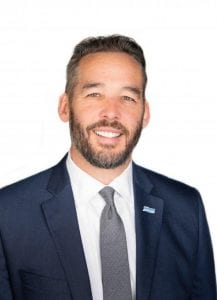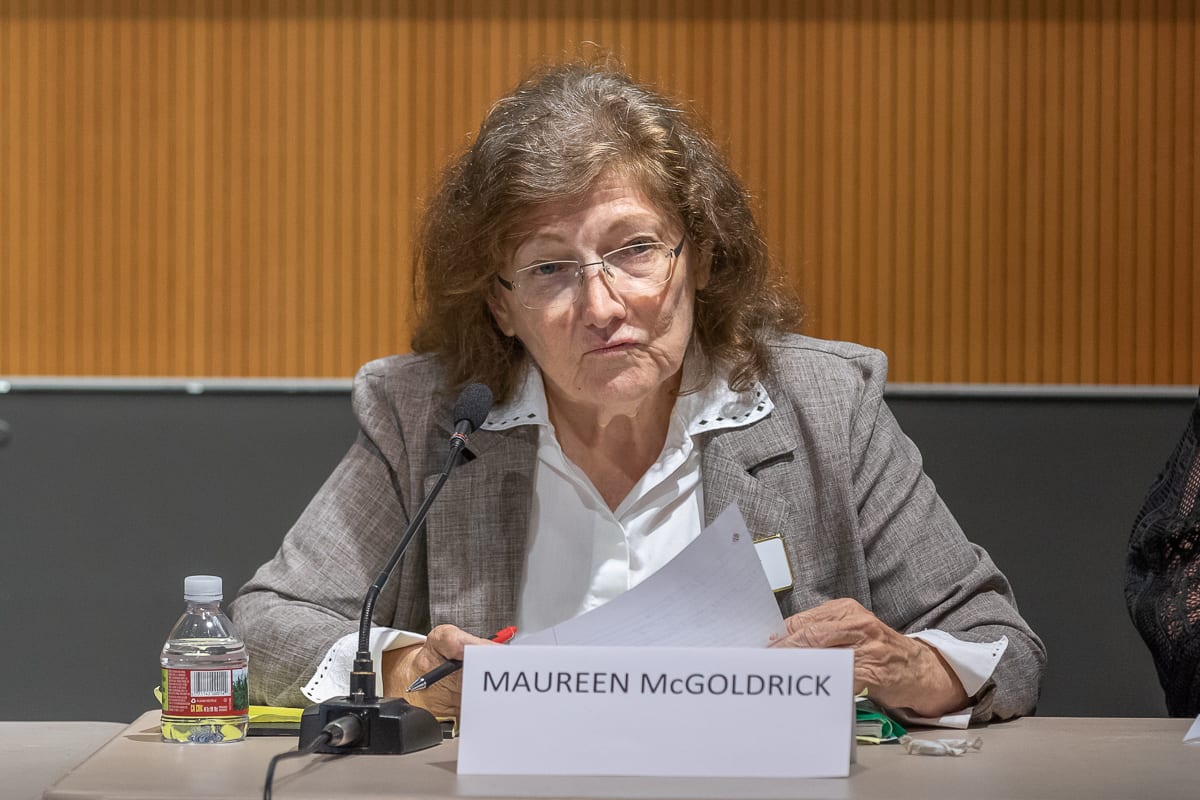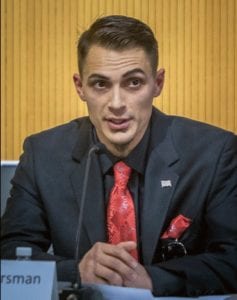The top two in next week’s primary will face off in November to fill the remaining two years on the seat vacated by Alishia Topper, who is now Clark County treasurer
VANCOUVER — With less than a week until the top-two primary election on Aug. 6, voter turnout has been low. As of Wednesday, 13.64 percent of eligible voters had turned in ballots.
Voters around Clark County will decide on several ballot measures, and city council races in Battle Ground and Vancouver.

(NOTE: While Vancouver City Council Position 5 is technically up for re-election this year, with Ty Stober trying to hold onto his seat against challenger David Regan, there are only two candidates. Since this is a top-two primary, and the race is nonpartisan, that race will only appear on the ballot for the November general election)
In Vancouver, three candidates are facing off for Position 2, including Erik Paulsen who was selected unanimously in January to fill the seat vacated by Alishia Topper. Topper vacated the seat prior to her successful campaign to become Clark County treasurer.
Paulsen, a senior vice president with US Bancorp Wealth Management in his day job, already served on a number of boards and commissions, including the city’s Planning Commission, the Southwest Clean Air Agency Board, the Vancouver Affordable Housing Taskforce, and more.
Paulsen will face off against Maureen McGoldrick, who was one of the six finalists chosen to be interviewed for the vacant position, and Justin Forsman. Both McGoldrick and Forsman have run and lost bids for city council twice before.

McGoldrick, 72, is a retired attorney from Southern California who also worked as a computer programmer. She has focused primarily on issues of homelessness, affordable housing, and transportation.
Forsman, 31, lists his occupation as vice president at Broken Pole Fishing Hole 4 Sounded Veterans, as well as working in the telecommunications field. His platform focuses on a pro-gun rights, anti-tax agenda.

“We are under attack not only from our media, the ones we elect to safeguard our liberties, the various unelected government agencies,” Forsman says in his voter’s pamphlet statement, “but further against each other.”
All three candidates recently took part in a League of Women Voters candidate forum, and this is a brief summary of their responses to the questions. You can view the entire forum in the video embedded at the end of this article (the forum for this race begins at the 29:30 mark).
Affordable Housing
One question centered on how Vancouver is using money raised through Proposition 1, which voters approved in 2016. The Affordable Housing Fund allowed the city to raise property taxes for seven years in order to create $42 million in funding to build affordable housing and create rental assistance programs.
To date, the city has awarded approximately $10 million for 19 projects to create or preserve 610 units of affordable housing (categorized as affordable for households earning 50 percent of the Average Median Income or less). A total of $1.25 million has been allotted for rental assistance programs through May of next year.
Paulsen said he believes, thus far, the money spent appears to be reaping tangible results, though more obviously needs to be done. He said it should be up to voters to decide if they want to continue the property tax levy in 2023, depending on whether the need remains great.
McGoldrick said she believes there needs to be more oversight to ensure money being given to builders is being spent on what was promised.
“We are not seeing the visible results we should see for this kind of money,” said McGoldrick. “Homelessness has increased 21 percent, especially among women veterans, and the planned income mixed income project was cancelled down at the waterfront.”
McGoldrick said she would prefer to see some of the money spent on a new Smith Tower type development to bring more affordable housing to the city’s downtown.
Despite his opposition to new taxes, Forsman said he felt most of the money from the Affordable Housing Fund had been well-spent.
“I think, definitely, as regards to the Navigation Center, there should be more police presence,” he said. “But other than that, it seems like there’s a very good start with the money that’s been taken from the taxpayers.”
Homeless Navigation Center
That comment by Forsman about the Navigation Center led into the next question, which centered on whether the candidates felt the project was achieving its intended goal of providing a central location for Vancouver’s homeless population to find services and help.
Forsman said he believes the day center being run by Share is having a positive impact for many of the people making use of it, but that it clearly has had an impact on the surrounding neighborhood,
“There are people coming from Multnomah County for the services,” he said, “people that aren’t even in the community. So there needs to be better effort to making sure that there’s not abuse taking place.”
Paulsen, who recently called for an outside review of the day center operations during a six-month update on the Navigation Center, said that the purpose of the facility seems to be a bit cloudy at the moment.
“We call it a navigation center, but it’s really a day center at the moment because we didn’t invest as much as we should have to make it a true navigation center,” said Paulsen. “And so, at the moment, the goals that we set forth as a day center are being met, numerically, however, there have been dramatic impacts in the surrounding neighborhoods.”
McGoldrick agreed with Forsman that greater police visibility is needed around the Navigation Center to help alleviate some of the neighborhood concerns. She said the center also needs to be focused more on getting people out of the cycle of homelessness, rather than just giving them a place to stay during the day.
“You know, those that are honestly just falling through the cracks and want help and want to get on their feet again,” she said.
Officer-involved shootings
On the topic of four officer-involved shootings by Vancouver Police earlier this year, the candidates were asked how they would address the concerns of the community. But first, moderator Jane Johnson asked if they had done a ride-along with police. Paulsen said he had, Forsman said he hadn’t, but planned to, and McGoldrick said “not with Vancouver Police.”
In regards to the officer-involved shootings, Forsman said he stands with law enforcement, but would like to see police body cameras adopted, “that way, if somebody makes an accusation against an officer, we know if it’s well founded or not. And we know if abuse is taking place.”
Forsman said he would also support random drug testing for officers to make sure they’re not on steroids which, he said, could lead to overly aggressive behavior on their part.
Paulsen said, in his view, the first step needs to be to acknowledge that every death at the hands of a police officer is a tragedy, no matter the circumstances.
“I think that we need to acknowledge the breadth of those impacted,” he said. “Not just the families and friends of the victims, but also the communities that they represent as well as law enforcement.”
Paulsen added that it’s his belief no law enforcement officer wakes up wanting to shoot someone.
“We should seek to understand each situation individually and let the investigation play out and put in place a course of action that’s appropriate to what we learn from that,” added Paulsen. “We should emphasize community policing and we should build relationships with our communities.”
McGoldrick circled back to homelessness, saying the 21 percent rise in people on the streets over the past year has created more tension between the transient population and Vancouver police.
“I can understand the police being more frightened with that increase,” says McGoldrick, noting that some more violent homeless “hide in place” among the general population. “I think we might benefit from the police and homeless advocates meeting on an ongoing basis to put attention to the little problems before they get to be bigger problems.”
Council districts
The candidates were also asked for their view on the potential of moving from the current at-large city council to one elected by districts. Paulsen said it will ultimately be up to the voters to make that decision.
“I do think that is a powerful first step, but only a first step to create diversity,” added Paulsen. “It is not a panacea in that regard, there’s much more work that would need to be done in order to truly have a council that’s representative of our community more broadly.”
Paulsen said his concern is that a council made up of districts might be prone to “provincialism,” with each member looking out primarily for the concerns of their own areas, or “bartering” behind the scenes between council members offering to support one idea in exchange for garnering support.
Forsman said he supports putting the idea to the voters, and likes the idea of a council that can more equally represent all areas of the city. Currently much of the council is made up of people who live west of I-205, but he has concerns about seats being left open if there aren’t enough interested candidates in one district.
“Because generally people aren’t running in certain areas, you know, the way things are, and what if that trend continues?” he said. “I’m always open to seeing things from a different perspective, but I personally I’m against it.”
McGoldrick says she would like to see a hybrid, with some seats elected by district and one or two at-large seats, “in order to make sure that the districts just don’t get their own issues that for the good of the city can not be forgotten. “
McGoldrick added that she hopes Neighborhood Associations and community groups are consulted at length before any idea of districting goes to the voters.
Traffic Congestion
The final question had to do with traffic issues around the city, and what the candidates would do to address it.
Forsman said the downtown area needs to be open to multi-story parking garages in order to free up space along streets for increased traffic.
“In the city of Vancouver, not only have we not expanded lanes, but we’ve actually consolidated a lot of four lane roads down into two to accommodate the people who have bicycles,” said Forsman. “I think maybe possibly converting unpopular alleyways for bike ways might be a good idea.”
In terms of interstate travel, Forsman said Vancouver needs to encourage more job growth in the city so people have the option of not commuting across the river, and said he would support at least doing research on the idea of a tunnel under the Columbia River instead of a third bridge.
Paulsen said he agrees that multi-story parking garages are going to be necessary in downtown Vancouver, but the city also needs to raise parking rates to increase incentive for people to use C-TRAN, walk, or bike into town.
“Right now it’s cheaper to park on a monthly basis in Vancouver than it is to buy a bus pass,” said Paulsen. “That shouldn’t be the case.”
Aside from downtown, Paulsen said the city has traffic challenges in many other places, including Mill Plain at Chkalov, SR-500 at Fourth Plain, and SR-14 east of I-205 in addition to the Interstate Bridge situation.
McGoldrick said she would focus some effort on a study into traffic light patterns in the city to help traffic flow more freely, and give pedestrians more time at some crossings, especially for the handicapped or elderly.
“There should be a privacy fence put in all the way along the highway 14 expansion, not just some of it. Every area is affected by that,” said McGoldrick, adding that, “there’s dangerous short exits on [SR] 500.”
As far as downtown, McGoldrick said the city needs better regulations to force new housing developments to include enough on-site parking for residents, and encourage more parking garages, even if they’re not aesthetically pleasing.
Closing statements
In their closing statements, Forsman started off by quoting George Orwell from his book 1984.
“In times of deceit, telling the truth is a revolutionary act,” he said.
Then he peppered in a quote from John Stuart Mill (often attributed to Edmund Burke), “the only thing necessary for evil to triumph is for good men to do nothing.”
“It was not my intention to run for public office prior to 2015,” said Forsman. “It’s easier looking the other way and to not feel obligated to anything outside of your direct and physical control. However, the argument can be made what’s really within one person’s control. Imagine Martin Luther King Jr. or George Washington never existing in our history books.
“I’m running to stop corruption, to get chemicals out of our schools out of our parks and out of our water,” Forsman concluded.
“We have a marvelous city here but like everywhere else it is still struggling with homelessness,” said McGoldrick. “We have to work harder on that.”
She said, if elected, she would focus on bringing new affordable housing to downtown Vancouver, similar to Smith Tower.
“In the 90’s we enjoyed four large corporations that provided good, clean, family-wage jobs,” said McGoldrick. “We have lost all but a greatly reduced Hewlett Packard because the county and the city changed their focus. We need to change it back.”
McGoldrick also pledge to continue fighting against tolls at the state line between Washington and Oregon, and push for a third crossing over the river.
Paulsen said his combination of business and civic experience would be useful as a city leader.
“I’m the only candidate in this race with eight years of experience policymaking in City Hall,” he said. “I understand the issues. I’ve proven myself as a thoughtful and effective member of city council.”
Paulsen said he would focus on bringing more economic development to Vancouver, including family-wage jobs and better housing affordability, noting that this election is only to fill the remaining two years of Topper’s original term.
“I’d also like for us to be able to come to agreement as a community as to what the next 10 years should look like,” he said, referring to the Stronger Vancouver initiative. “What kinds of investments we want to collectively make as a community, and how we’re going to make those investments work.”
You can learn more about the candidates and their positions by clicking on the links below:
Maureen McGoldrick (no website listed)




